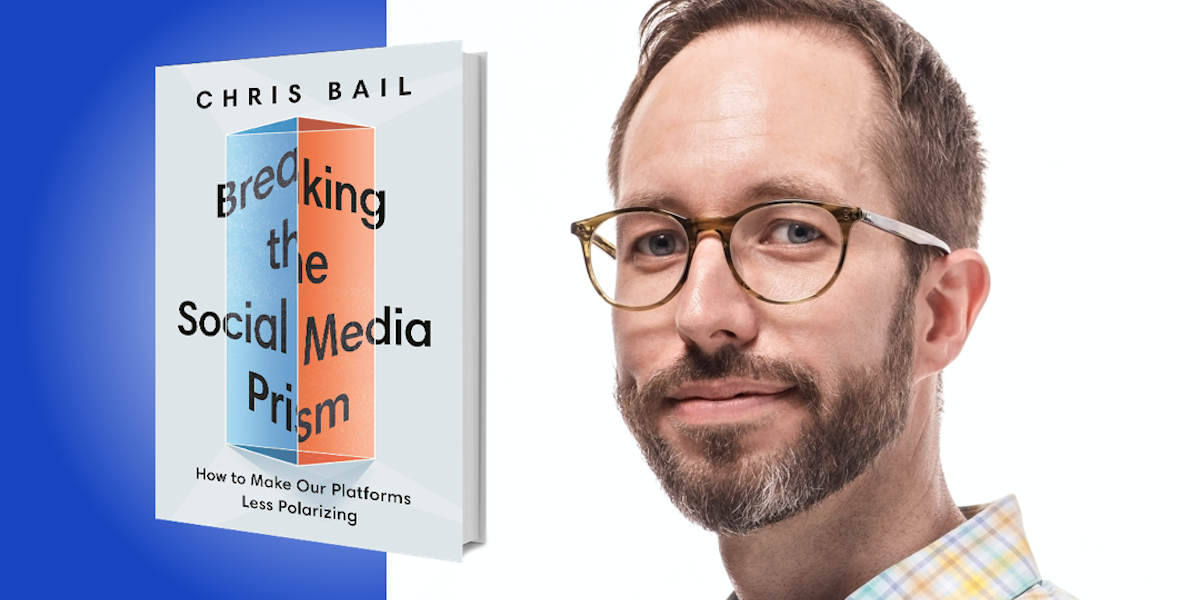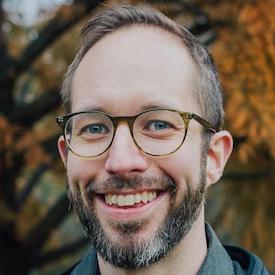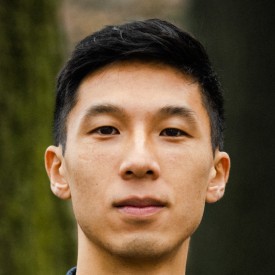Chris Bail is a professor of sociology, data science, and public policy at Duke University, and the director of the Duke Polarization Lab. Chris has made it his mission to use social science and data science to invent practical techniques for those of us who feel helpless to the perils of social media, and want to do something about it.
Below, Chris shares 5 key insights from his new book, Breaking the Social Media Prism: How to Make Our Platforms Less Polarizing (available now from Amazon). Download the Next Big Idea App to enjoy more audio “Book Bites,” plus Ideas of the Day, ad-free podcast episodes, and more.
1. Most of the common wisdom about how social media divides us is wrong.
Echo chambers, foreign misinformation campaigns, algorithmic radicalization—these are three of the most prevalent ideas about how Facebook, Twitter, and other social media platforms are tearing us apart. And while all three ideas are powerful and seductive, especially when they’re articulated by the same people who built our platforms and have some regrets about their inventions, is there really any evidence for these claims?
When I set out to research this in 2018, I discovered some startling things. My colleagues and I conducted a unique experiment in The Polarization Lab. We paid a large group of Republicans and Democrats to follow bots that exposed them to members of the other side. This would take them outside their echo chamber on Twitter for a month. Now, this was supposed to make them more moderate. It was supposed to help them realize that there’s two sides to every story, humanize the other side, and so on. Unfortunately, this isn’t what we found. Nobody became more moderate, and many people actually became more extreme.
How about those foreign misinformation campaigns? Are they actually changing anybody’s mind? After merging Twitter data with other data that we collected in the lab, we were shocked to discover that there was almost no effect from exposure to a foreign misinformation campaign on a person’s beliefs regarding social policy issues, or even their beliefs about the other party.
Algorithms and radicalization—this one is tricky to study, but our best research has suggested it might be an exceptionally rare phenomenon, happening to less than 2% of people, or maybe even one out of a hundred thousand people.
What’s the upshot? Even if media platforms enacted sweeping reforms to address echo chambers, foreign misinformation campaigns, and algorithms that radicalize us, this might not really tip the scale very much, and we would still have big problems.
“Social media should enable better competition of ideas, but what I discovered is that it actually creates a battle of identities.”
2. The problem is us.
Meet Dave Kelly. Dave Kelly was a moderate Republican concerned about climate change and not a big fan of President Trump. But after one month of participating in our study, where we paid Dave to follow a Twitter bot that exposed him to prominent Democrats, he became a lot more extreme. He began voicing conspiracy theories about climate change, for example, and even defended former President Trump. What happened? Common wisdom suggests that social media should enable better competition of ideas, but what I discovered is that it actually creates a battle of identities. We think of social media as a place we go to get information or maybe entertain ourselves for a few minutes, but in this era of increasing social isolation, it’s also becoming one of the main ways we understand each other and ourselves.
One of the weird things about us humans is that we care so much about our identities. Whether we know it or not, all of us present different identities to the world each day, then observe how other people react, and cultivate the identities that make us feel socially accepted and good about ourselves. Social media has changed all of this. We have much more flexibility in how we present ourselves and powerful new tools to observe what other people think of us. Though we use social media as if it were a giant mirror to understand our place in the world, it’s more like a prison that fuels status-seeking extremists, mutes moderates, and leaves all of us feeling much more polarized than we really are.
3. The social media prism is normalizing extremism.
Jamie Laplace is a medical assistant who lives in one of the reddest parts of the United States, but Jamie is not a Republican. In fact, he has very strong liberal views that make him feel like a minority. He’s lost friends from high school over arguments about President Trump, and his half-Republican, half-Democrat family can’t even watch a football game together anymore. Jamie is a mild-mannered guy in real life and does not often talk about politics. But on social media, it’s an entirely different story.
“Just as we tend to exaggerate the extremity of those on the other side, research indicates we also tend to minimize radicalism on our own side.”
Each night after work, he picks up his phone and starts trolling prominent conservatives late into the evening, even though he knows he’s not changing anyone’s mind. So why does he do it? Each time he goes on the offensive, Jamie’s phone starts to light up with likes and new followers. Even though Jamie doesn’t know these people at all, I think they’re giving him something he really needs—a way to belong. Even though extremists like Jamie make up less than 6% of the population, give or take, a recent study indicates they’re responsible for more than three-quarters of all posts about politics on Twitter.
4. The social media prism is muting moderates.
I know what you might be thinking: I’m not an extremist, and I certainly don’t depend on social media for my sense of self-worth. It turns out you are not alone—most people aren’t extremists. Most people are more like Sara Rendon, a moderate conservative woman. Sara’s husband is a responsible gun owner who visits a local shooting range every once in a while. One day Sara was watching an argument unfold about Americans’ right to own guns, and she posted a relatively moderate message about her husband’s right to own a firearm. Sara was quickly inundated with insults and threats. One person even said that they hoped that her kids found her husband’s gun and shot her. This experience was harrowing for Sara, and it sent her running from social media.
Facebook had already been getting out of hand for her. She had recently unfollowed her liberal relatives from New York when, she said, they were becoming unhinged over Brett Kavanaugh’s appointment to the Supreme Court. For moderates like Sara, social media does not create a sense of status and self-worth. She had a happy life depicted online with two great kids, but now she has become all but invisible across platforms, because posting about her political views, even though they are very moderate, became a liability.
“We, the citizens of social media, have the power to chart a different course.”
At the same time that social media amplifies status-seeking extremists, it’s also muting moderates like Sara, creating a phenomenon we social scientists call “false polarization.” Because extremists are so much more vocal, we can begin to think that they represent their entire party. And just as we tend to exaggerate the extremity of those on the other side, research indicates we also tend to minimize radicalism on our own side. As a result, all of us feel much more polarized than we really are. Social media has set this process of false polarization into hyperdrive.
5. New technology will help us bridge partisan divides.
If social media is doing all this bad stuff, shouldn’t we just stop using it? This has become a fashionable idea, and large numbers of people have deleted their accounts—but research shows that most of the people who delete their accounts come back. As for the generation of young people who grew up with social media, deleting their accounts is pretty much unthinkable.
Considering the increasing social, cultural, and geographical distance between Democrats and Republicans, social media may actually become one of the last places where we can have important conversations across party lines. Though it may be depressing to learn how much social media users are driving political polarization, it also means that we, the citizens of social media, have the power to chart a different course.
So, what can people do to make social media a less polarizing place? Here are three things to get started: The first is to learn how to see the social media prism and understand our politics. The second is becoming more introspective about how our own behavior, or our lack of engagement on social media, contributes to the bigger picture. The third is learning how to identify people on the other side with whom you think you can agree to disagree.
Of course, becoming more mindful of how we use social media is easier said than done. And though I think we need a bottom-up movement to fix this problem, I also think social media platforms could make a variety of changes that would create status for people who are reaching across party lines, instead of taking each other down.
For more Book Bites, download the Next Big Idea App today:
































